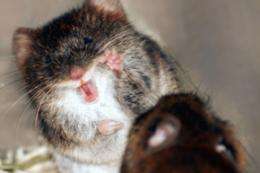Sex explains why the fit don't always survive

(ĖĮÐÄĘÓÆĩOrg.com) -- New research from The Australian National University has shown how genetic variation persists through generations, rather than being bred out in an evolution towards a âperfect typeâ.
In an international collaboration, researchers from the Research School of Biology at ANU and colleagues from Finland and France carried out a combined field and theoretical study on the breeding behavior of European bank voles - a small mouse-sized rodent common in Europe and Great Britain.
The research team observed that males which carried the genes for behavioral dominance were more successful at winning mates. However, their gene-sharing female siblings were less successful, having smaller litter sizes. In contrast, females which didnât carry the genes for behavioural dominance had larger litter sizes.
This phenomenon is called sexual antagonism â where a particular gene is beneficial for one sex, but decreases success for the opposite sex. Co-author and PhD candidate at the Research School of Biology at ANU Jussi Lehtonen said that the findings show that reproductive success doesnât run in the family.
âWith sexual antagonism such as this, itâs sometimes hard to understand how different genes are maintained in the reproductive process, because if the beneficial effect is much stronger in one sex, one would assume that only the gene with best overall success should be maintained,â said Mr Lehtonen.
The research found that, although genes that were maladaptive for one sex were to some extent carried through to the next generation by its more successful opposite-sex siblings, the disparity in the genesâ effects for the two sexes was so strong that this would be unlikely to maintain genetic variance by itself.
The researchers also found that the dominant gene was only beneficial for males when it was rare in the population, a process known as negative frequency dependence. It is this frequency dependent effect that helped maintain genetic diversity in their study system.
âMales with the dominant gene are quite aggressive, so when the gene gets more common in a population, dominant males are more likely to spend their time fighting, and the tame males get an advantage at that point,â said Mr. Lehtonen.
This research gives a valuable insight into how genetic variance is maintained over generations and how population factors can influence genetic diversity. The researchersâ findings have been published in Science.
Provided by Australian National University














